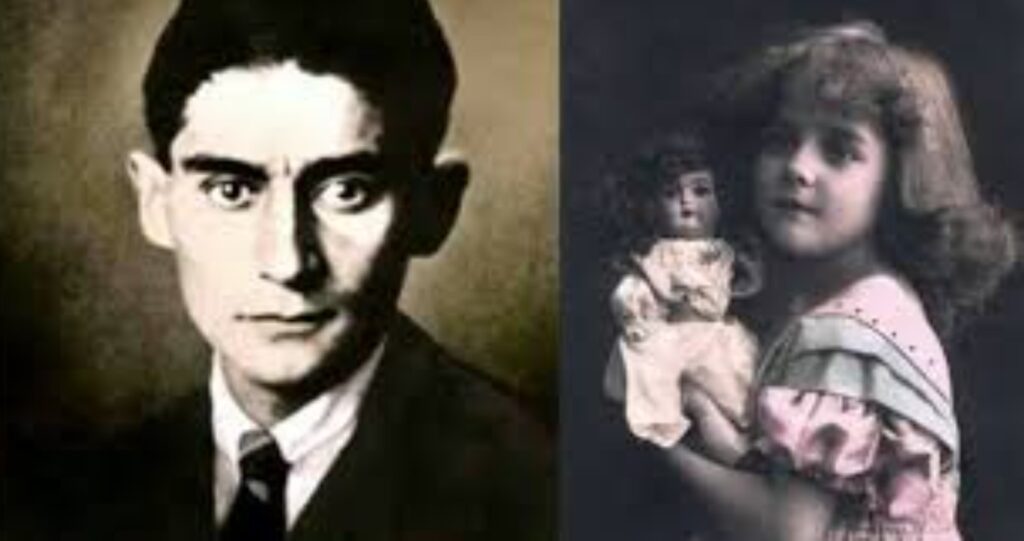The Heartwarming Story of Franz Kafka and the Little Girl’s Lost Doll

The Heartwarming Story of Franz Kafka and the Little Girl’s Lost Doll
The Unexpected Encounter in a Berlin Park
Franz Kafka, celebrated for his deep and often enigmatic literature, found himself in a profoundly touching situation at the age of 40. While walking through a Berlin park, he noticed a young girl sobbing on a bench. Concerned, he approached her and asked what was wrong. She explained through tears that she had lost her beloved doll. Kafka, deeply moved, decided to comfort the girl in an extraordinary way—one that would forever remain a testament to his compassion and creativity.
Kafka’s Unique Solution to Console the Girl
Instead of simply consoling her with generic reassurances, Kafka wove a tale on the spot, telling the girl that her doll wasn’t lost but had gone on an adventure. To make his story convincing, he promised that the doll would write to her, sharing updates about its travels. The girl, intrigued by this idea, agreed to meet him at the park the next day to receive the first letter. Thus began an unexpected and heartwarming exchange.
The Letters of Adventure Begin
Each day, Kafka returned to the park with a meticulously written letter, posing as the doll. In these letters, he described the doll’s “travels” to far-off places, meeting new friends, and learning about the world. The letters were filled with imaginative stories and vivid descriptions, which delighted the girl and gave her something to look forward to every day. Through this act, Kafka turned the girl’s grief into excitement and curiosity.
The Profound Creativity Behind the Letters
Kafka’s letters were not mere scribbles—they were masterfully written, reflecting his literary genius. He tailored each letter to the little girl’s emotions, making the doll’s adventures relatable and comforting. These letters didn’t just provide closure but opened a window to a magical world, where love, loss, and change were gently introduced in a way that a child could understand. This simple yet profound gesture exemplified Kafka’s ability to connect with people on a deeply human level.
A New Chapter: The Return of the Doll
As Kafka’s health declined, he realized he needed to bring the story to an end. One day, he brought the girl a new doll, explaining that the doll had returned from its travels. He carefully noted that the doll’s adventures had changed it, which explained why it looked different. The little girl accepted the new doll with joy, embracing it as if it were her old companion. Alongside the doll, Kafka handed her one final letter that would carry a powerful message.
The Final Letter’s Powerful Message
The last letter from the doll was a poignant one. It read: “My travels have transformed me. Change is an inevitable part of life, and I am no longer the same, but I am still filled with love for you.” This heartfelt message subtly prepared the girl for the reality of change and loss, offering comfort and wisdom that would stay with her for years to come. Kafka’s foresight in crafting such a letter speaks volumes about his understanding of human emotions.
A Rediscovered Note Years Later
Years after Kafka’s passing, the girl, now an adult, found a hidden note inside the doll. This note carried a timeless message from Kafka:
“Everything you love will probably be lost, but in the end, love will return in another way. Embrace change; it is the essence of growth.”
This discovery brought tears to her eyes, as it encapsulated the kindness and wisdom of the man who had once comforted her during her childhood.
Kafka’s Legacy Beyond Literature
Although Franz Kafka is primarily remembered for his literary masterpieces, this story reveals a softer, more compassionate side of the man. His interaction with the little girl showcases his deep understanding of human vulnerability and his extraordinary ability to turn pain into something beautiful. This real-life tale adds a new dimension to Kafka’s legacy, making him not just a literary icon but also a symbol of empathy and kindness.
The Enduring Impact of Kafka’s Gesture
This story has resonated with people across generations, reminding us of the power of small acts of kindness. Kafka’s decision to console a grieving child with letters not only brought her comfort but also taught her valuable lessons about change and resilience. His actions highlight how a simple gesture can leave a profound impact, transforming sorrow into hope and loss into love.
A Timeless Lesson for All of Us
Kafka’s interaction with the little girl is a testament to the importance of compassion, imagination, and the human connection. In a world that often feels chaotic and unpredictable, this story reminds us that even the smallest acts of kindness can ripple through time, leaving a lasting mark on the lives of others. It encourages us to embrace change, cherish love in all its forms, and find ways to bring light into someone else’s life.





